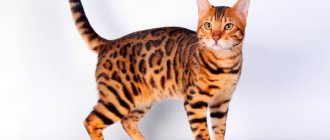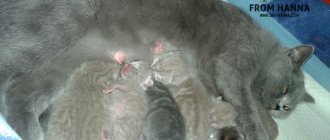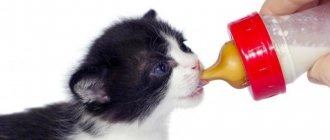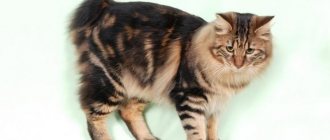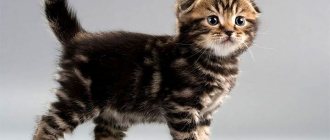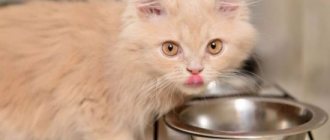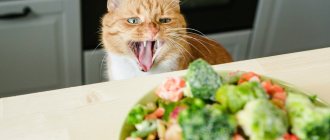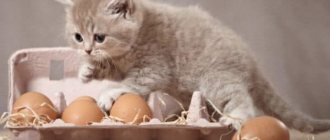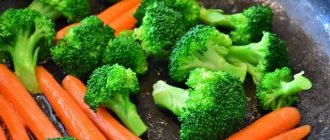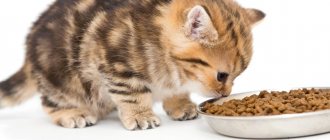To keep your kitten healthy, you need to choose the right diet. From birth, mother's milk is the source of nutrients, but what should you feed your kitten when he starts to grow up and homemade food is not quite suitable?
Now we will talk about how to feed newborn fluffies. If, for some reason, the mother cat refuses to feed the baby and rejects him, you need to find a milk formula to feed for the first two weeks, until the baby gets stronger. This mixture can be purchased at pet supply stores.
Feeding one-month-old kittens with cow's milk or goat's milk is strictly prohibited! His weak and fragile body simply cannot cope with the fat content and will not be able to digest it!
Usually kittens are watered and fed from a special bottle with a nipple, like for children. Sometimes they resort to using pipettes for ease of feeding if the kitten is unable to suck on its own. You can also give medications if you visited the veterinarian and were prescribed something.
Now you know what to feed newborn kittens up to one month. If something doesn't work out, try again and again. Persistence will prevail. If he refuses to suck the nipple on the bottle, wet his face with the mixture and as soon as he starts licking, try to place the nipple in the mouth and keep it there until he understands that he needs to suck food.
Kitten and baby food
A newborn, one-month-old kitten can be fed with diluted baby formula and baby meat puree, but it is better to purchase a cat's milk substitute at a pet store.
It is best to feed a newborn kitten using a pipette or syringe tip without a needle. At one and a half months, kittens can lap and eat small pieces, and you can put a bowl for them. Read more in the article on what you can feed a kitten, which shows the rules and secrets of feeding from 1 week to a year.
Features of specialized feeds
There is no need to fuss with cereals and broths, calculate calories, buy supplements and vitamin preparations, or come up with a menu for tomorrow. Others did everything for you. Just follow their advice on how much your pet should eat.
How much should you feed a kitten?
On the back of the package you will always find a table with the daily intake. Standards may vary from one manufacturer to another, as may the composition of the feed.
By the way, about the composition. Be sure to watch it. The inventors of cheap mass-produced food use almost no meat. Its “analogue” is minced meat made from bones, skin and even feathers. They do not disdain dyes and flavors. In addition, our pets are fed too many mineral salts. The benefits of such nutrition are questionable, but the harm is obvious. Low-quality food has little nutritional value, it is worth feeding once, the animal requires more and more food, but the most important thing is that a bad product causes kidney and liver diseases. By saving on food, you will splurge on the veterinarian.
So, how much specialized food should a kitten eat per day? The quantity depends on the weight of the cat. The recommended diet is 75% dry food, 25% wet food. There will be no harm if the amount of wet food (pouch or jar) is half the daily dose. Often, racking their brains about what to feed their 1-month-old kittens, owners mix dry and wet food in one plate. We do not recommend doing this. Better give it separately. Ideally, wet food should be at a comfortable warm temperature. If you warm it up a little (up to 38-40 degrees), it becomes more fragrant.
For feeding, it is better to use a low, wide container that is comfortable for the kitten. Vitamin-mineral complexes, no supplements needed
Only in individual cases, on the advice of a veterinarian. Important! Your pet should always have access to a container of clean, not cold water. Dehydration is a deadly enemy
If a kitten eats dry food, its body definitely needs four times more moisture. Sometimes you hear that animals are smart! – find the liquid themselves. They climb into the bathtub or kitchen sink, lick water from the walls... Moisture with residues of household chemicals - is this really what you should feed your cat?
How many times a day should you feed?
Often, on average 5-6 times a day, in small portions. By six months, reduce to three times. Adult cats are recommended to be fed twice a day. In general, the diet is considered correct if the kitten is well-fed, but the skeleton is easily palpable, looks healthy, the coat is shiny, and the weight increases with growth.
Natural food: how to feed it correctly?
Are you leaning towards natural foods? Approach this like an adult. A cat should grow up to be an omnivore, try different things, and not be stuck on one product. The argument that wild cats are mono-feeders in nature does not hold water. If rural hunters who catch mice meet the body’s needs for protein, carbohydrates, vitamins, and minerals, then where will you get a fresh mouse for a city dweller?
What can/should a kitten 3 months and younger eat?
- Meat, daily. Lean beef, chicken, turkey, rabbit. Boiled, raw or scalded. Cut into small pieces or ground into minced meat.
- Meat by-products: heart, liver, lungs, chicken stomachs. Ground or finely chopped, boiled or scalded.
- Milk, of course, every day. This is the basis of a child's diet. Later there will come a time when the body begins to poorly absorb this product. The teenager himself will refuse it. And for up to four months, this source of calcium is simply necessary.
- Fermented milk products: fermented baked milk, kefir, cottage cheese diluted with milk, low-fat sour cream.
- Fillet fish occasionally, no more than once a week. And only boiled. Raw fish (worms) and in large quantities (fluoride) are contraindicated.
- Eggs, quite often. Raw (whole, beating the yolk and white, or just the yolk) or boiled. Alone or with milk.
- Liquid porridge with milk or meat broth with the addition of meat. Oatmeal, oat flakes, buckwheat, rice, millet.
- Vegetables, raw and cooked. The kitten, of course, won’t bite the carrots, but you can crumble a little bit into meat pates and porridges. By the way, it is better not to use potatoes: starch is difficult to digest.
- A drop of vegetable oil a day to improve digestion.
- Ready-made vitamin and mineral complexes for kittens.
By the way, about the kitten, 1.5 months old. What to feed this baby? You can use ready-made baby food in jars - a mixture of meat and vegetables. Pates without salt, with vitamin supplements, are made from quality products.
What should you not feed your kitten (cat)?
- Pork (risk of contracting worms), fatty meat in general.
- Sharp, tubular bones (risk of injury, choking).
- Salty, spicy, smoked, fried, sweet, homemade canned food and sausage.
Why is fish dangerous for cats?
Let’s immediately decide that a cat should not be fed salted, dried, pickled or smoked fish. This taboo is not discussed. The arguments below relate to frequent consumption of fish and ignoring basic recommendations.
Development of renal failure. Even if you feed your cat boiled fish without adding salt, the pet will receive trace elements in excess. The kidneys are responsible for eliminating excess salts (namely, they pose the greatest danger). With daily increased stress, the kidneys will wear out much faster, which will shorten the cat's lifespan.
Development of urolithiasis. Fish contains microelements, the excess of which leads to changes in the pH level of urine; the main danger is phosphorus and magnesium, the accumulation of which begins to form sand and stones in the bladder, and then in the kidneys.
Infection with helminths. If you feed your cat raw fish, especially river fish, your pet is guaranteed to suffer from parasite infestation. The danger is that fish (especially carp varieties) are carriers of very dangerous types of worms. Unlike intestinal worms, parasite larvae in river fish can travel throughout the body. Dangerous parasites are difficult to identify; most often they manifest themselves at an already severe stage of organ damage. Please note that worms can live in the liver and gall bladder, kidneys, tissues and muscles, and pancreas.
Avitaminosis. Fish is a healthy, nutritious and rich product, but it contains a vitamin B neutralizer. If fish is consumed too often, a cat’s body develops iron deficiency and, as a result, iron deficiency anemia. The combination of vitamin B deficiency and anemia leads to impaired absorption of vitamin E and K. Moreover, vitamin K is synthesized in the presence of E. Vitamin K is important for the normal functioning of the circulatory system, namely, the blood clotting process. As a result, frequent consumption of fish leads to two very serious problems - anemia and sudden, heavy bleeding. Low hemoglobin and blood loss are, as you can imagine, a deadly combination.
Excess iodine. Iodine should be present in the cat's metabolism, but in small quantities. The problem is that the body continues to absorb iodine even if there is an excess of it. The first organ that suffers from iodine deficiency or excess is the thyroid gland. With frequent consumption of fish, the thyroid gland begins to work much more actively, which leads to the production of too many hormones - hyperthyroidism. Disruption of the thyroid gland is guaranteed to lead to the development of other ailments, at an early stage, to metabolic disorders, weight gain or loss.
Injuries. Fish bones are one of the most common causes of injury to the digestive system in cats. The bone can injure the esophagus or intestines. We have already said above that frequent consumption of fish impairs blood clotting. There are known cases of the development of heavy internal bleeding due to minor trauma to the intestine with a fish bone. When eating fish with bones, a cat may choke and choke on its own saliva or vomit.
Allergic reaction. Some owners do not give their cats eggs for fear of allergies, but they give them fish every day. For your information, fish protein is much more allergenic than eggs and even honey. At the initial stage, the allergy leads to itching and deterioration of the hair and skin. If the situation is ignored, the cat will develop other, more serious illnesses.
Chemicals. Fish literally absorbs the environment, or rather, its chemical residues. Scientists talk about the pollution of oceans and water bodies, but these facts are ignored. By the way, fresh (stagnant) water contains a huge amount of bacteria, chemicals predominate in the seas, and oil and garbage predominate in the oceans. As a result, fish meat is replete with heavy metals, chemicals, chlorine and pesticides, with the help of which humanity is accustomed to fighting pests.
The human body has adapted to eliminate many unusual chemical components of food, and cats are under great threat. Experts advise feeding cats only noble varieties of fish, but these should not be given frequently. All noble fish are farmed, that is, they are grown artificially and not caught in reservoirs. To make the fish grow faster, hormones are added to the water, so that they do not get sick - antibiotics and other chemicals.
Change in personal scent. Cats are very picky about their scent; they try to mark their homes with it, including personal belongings. If your pet often eats fish, its smell changes noticeably. Simply put, under normal conditions you should not be able to smell your cat's litter box (relatively fresh), if the cat eats fish...you get to enjoy the scents of the litter box. There are several reasons for this phenomenon, but the main ones are changes in urine acidity and metabolic disorders.
At 1.5 months
Below we will consider how and what to feed a 1.5 month old kitten at home:
At this age, the pet can already feed on its own, and its diet should be balanced. At this age, the kitten can be fed:
- rolled oats and buckwheat porridges;
- vegetables (any vegetables, except potatoes, served boiled or raw);
- raw meat (low-fat varieties). Served raw, boiled or scalded with boiling water. Meat products make up from 60 to 80% of the total daily food volume.;
- boiled offal;
- cottage cheese - 30 g per day, preferably not fatty;
- raw fish, previously doused with boiling water (about 1 time every 7 days);
- greens (you can ask at the animal department).
How often should I feed?
Kids eat a lot, 5-6 meals a day is the norm. In general, a kitten should eat 120 g per day. The baby cannot eat this amount at once. If the kitten eats less than normal, then you should try changing the food. If the animal refuses food, it is better to contact a veterinarian.
Once the kitten reaches 2 months, you can feed it a little more - up to 180 g
At this moment, it is important to monitor the pet’s activity - more playful and active animals need more food.
If you are going away for the day and leaving your kitten alone, feed him before you leave and leave some food in his bowl and feed him more when you return.
Food additives
Do not neglect this important point - vitamins and supplements will have a beneficial effect on the kitten’s body.
From 1.5 months you can add to food:
- Kitzim;
- "Doctor Zoo";
- "Brevers";
- "Farmavit";
- "Biofar".
Before purchasing vitamins, consult with specialists. Veterinarians can advise you on which food supplements are best for your pet and whether your pet needs them at all. The most popular supplement for cats is fish oil. Veterinarians advise giving it 2 capsules for 7 days.
What not to give to a kitten
Every caring owner should remember the list of prohibited foods. Kittens should not eat:
- food with spices (the kind that people like);
- fatty meat: pork, beef;
- human medicines;
- sweets;
- river fish;
- legumes;
- fatty dairy products;
- flour;
- potatoes.
Is it possible to have ready-made food at 1.5 months?
Cat owners and veterinarians do not recommend mixing food and natural food. Many people primarily purchase ready-made cat food for a number of reasons:
- saving time;
- nutritional balance.
If you want to feed your pet food, you should consider that:
- it will not be possible to switch to natural nutrition;
- You cannot mix food of different brands, as they contain different microelements;
- Only high-quality commercial feed is suitable for feeding.
Choose high-quality, balanced food and your kitten will not have any health problems.
Kittens love wet food, but it's a little more expensive. However, according to veterinarians, dry, high-quality ones are more useful.
It is worth noting that wet food contains about 80% water, and your pet does not need to constantly drink water. With dry food, everything is different - there should always be a clean bowl with drinking clean water near the food bowl.
Veterinarians consider the following brands to be good food:
- Royal Canin;
- Almo Nature;
- Pro Plan Junior;
- Eukanuba Puppy Kitten.
The price tag may scare the kitten's owners, but believe me, by purchasing good food, you only win. You won’t have to buy additional vitamins, and the kitten will be healthy, and you won’t have to spend money on treatment.
Veterinarian advice
The first and most important thing that veterinarians remind you of is that your pet’s diet should be stable, without surprises or sudden changes. It is recommended to immediately determine whether the pet will receive natural food or a ready-made balanced diet. If the animal eats food, fresh foods should be introduced into its diet occasionally, as complementary foods.
For an animal suffering from constipation or other stool disorders, eating disorders are most often characteristic. If the owner gives porridge and meat one day, and only dry food the next, this is guaranteed to lead to problems in the digestive system. It’s worth talking to the breeder about what diet the baby is used to.
It is recommended to give seafood with caution - they can cause increased intestinal motility or lead to stool upset. If problems have already arisen and last more than a day, the animal loses appetite, becomes weaker, or discharge appears from the eyes, you should immediately consult a doctor
For information on what to feed British breed kittens, watch the following video:
Canned food
High-quality canned food contains all the beneficial substances a 1.5-month-old kitten needs. And rather than feed your baby haphazardly from the table, it is definitely better to buy a ready-made nutritious lunch. Canned food is given according to the manufacturer's recommendation from 2 months, but fermentation can reduce this age to 6 weeks. Such elements are already semi-digested, they are easier to digest and do not burden the gastrointestinal tract. Of course, we are only talking about good food for the little ones:
- Animonda, Nature's Protection;
- 1st Choice, Brit Care, Almo Nature;
- Hill's, Pro Plan, Royal Canin.
Canned food cannot be combined with natural products; you need to choose one. The final chemical composition of the intestinal flora and gastric juice is still being formed. The ready-made diet contains easily digestible elements to which the baby’s digestion quickly gets used to. Digesting regular food requires different enzymes and more time. Therefore, the combination of canned food and natural food causes stress and disrupts the functioning of the gastrointestinal tract.
How many times to feed
Regarding the rule for the number of feedings per day, it is necessary to start from the age of a particular individual. Below, all the data is given for absolutely healthy babies with normal growth of subcutaneous fat:
- newborns need to be fed at night, they need to be fed at least 10 times in 24 hours, this applies to all newborns up to 14 days;
- if the baby is from 15 to 30 days old, then feed him a maximum of 8 times a day, night time is also included in the calculation;
- starting from the age of one month, the pet is no longer fed at night, until two full months it receives food up to 7 times;
- up to three months he eats up to 6 times.
Gradually, every 2-3 months, the number of meals decreases, the energy value of the products increases, which makes it possible to limit oneself to two feedings a day already from the first full year of an individual’s life. Feeding time is determined individually, but more often owners and breeders recommend feeding once in the morning before 8-9 am, once in the evening - until 20-21 o'clock.
